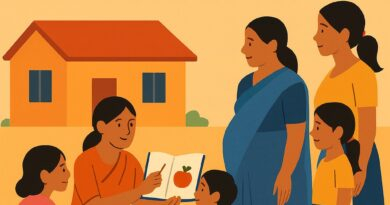SUPPORT TO TRAINING AND EMPLOYMENT PROGRAMME FOR WOMEN (STEP)
About STEP:
The STEP Programme aims to increase the self-reliance and autonomy of women by enhancing their productivity and enabling them to take up income generation activities. It provides training for skill upgradation to women in the traditional sector viz. agriculture, animal husbandry, dairying, fisheries, handlooms, handicrafts, khadi and village industries sericulture, social forestry and wasteland development.
Objectives
- To mobilise women in small viable groups and make facilities available through training and access to credit.
- To provide training for skill upgradation.
- To enable groups of women to take up employment-cum-income generation programmes by providing backward and forward linkages.
- To provide support services for further improving training and employment conditions of women.
Implementing Agencies
The scheme is implemented through Public Sector Organisations, District Rural Development Agencies, Federations, Co-operatives and Voluntary Organisation registered under the societies Registration Act, 1860 or under the corresponding State Acts. Recipients of financial assistance under STEP are required to be bodies, organisations or agencies working in rural areas, although their headquarters may be located in an urban areas.
Target Group/ Beneficiaries
The target group to be covered under the STEP Programme includes marginalised, assetless rural women and the urban poor. This includes wage labourers, unpaid daily workers, female headed households, migrant labourers, tribal and other dispossessed groups, with special focus on SC/ST households and families below the poverty line.
Pattern of Assistance
(a) 100 Per cent assistance
- Project staff and administrative cost.
- Training-stipend, training of trainers, skill upgradation reinforcement, trainingcum-production centres and raw material for training
- Support to members for formation of co-operative societies, producers, workers co-operatives leading to formal legal organisation.
- Support services-education, general awareness, health-care, sanitation, nutrition/creche facilities for dependent children, wherever convergence of these services are not available will be provided as part of the project cost.
- Marketing support – marketing/sales personnel, stock provision and buyers credit godowns, marketing outlets, quality control and managerial support;
(b) 50 per cent assistance
Construction of individual worksheds and production centres not related with training 50 percent of the total cost on this complement will be borne by the Government of India and 50 per cent will have to be borne by the implementing agency.
Scheme Benefits & Highlights
The scheme has 2 fold objectives viz.
- To provide skills that give employability to women.
- To provide competencies and skills that enable women to become self-employed/entrepreneurs.
Eligibility
Scheme Target Group
The scheme is intended to benefit women who are in the age group of 16 years and above.
ELIGIBLE ORGANIZATIONS/ PROJECT IMPLEMENTING AGENCIES (PIAs)
Grants-in-aid under the STEP programme may be given to an institution having a distinct legal entity as under:
- Institutions or organizations set up as Autonomous Organization under a specific statute or as a Society registered under the Societies Registration Act, 1860 or Indian Trusts Act, 1882 (Not for profit) or other statutes.
- Voluntary Organizations or Non-Government Organizations registered under the Societies Registration Act, Indian Trust Act carrying out activities which promote the objectives of the STEP programme, with adequate financial and other resources, credibility and experience of the type of activities to be undertaken.
- Co-operative Societies.
| “I measure the progress of a community by the degree of progress which women have achieved.” – Dr. B.R. Ambedkar |
Discover more from Simplified UPSC
Subscribe to get the latest posts sent to your email.



